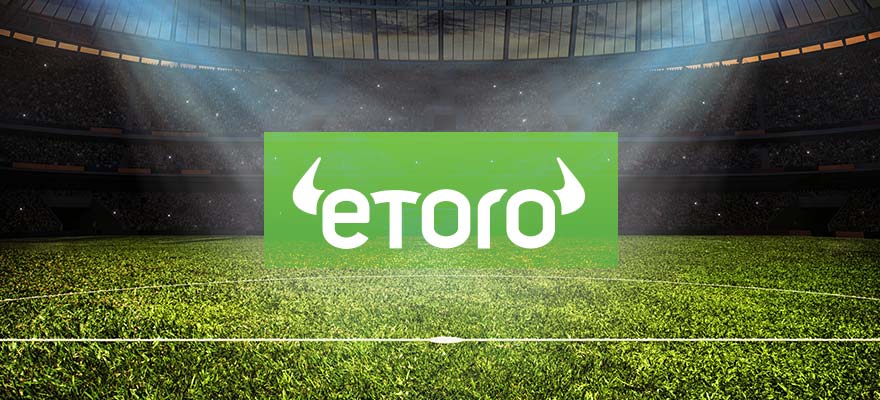Last week, Finance Magnates on social trading and investing platform eToro’s historic partnership with seven Premier League football teams. The sponsorship agreement is not only significant because of its size (an estimated £4-5 million), but also because of the fact that the teams will all be paid in Bitcoin.
More specifically, eToro has partnered with #5 team Tottenham Hotspur, as well as Brighton & Hove Albion, Cardiff City, Crystal Palace, Leicester City, Newcastle United, and Southampton.
The move represents one of the largest partnerships between sport and cryptocurrency to date. The practical benefits of the deal for both parties are fairly clear–but what are the wider implications for the industry at large?
eToro Charges Forward
As part of the deal, eToro is responsible for the creation of the teams’ . In other words, the teams are reliant on eToro to store their bitcoins, at least for the time being.
“We paid the first instalment of the sponsorship deal with the seven clubs in bitcoin. eToro created a digital wallet for each of the seven clubs and the bitcoin was transferred to these wallets,” Crayston said.
The football industry in the UK is huge, with a reported value of £4.4 billion in 2017. If nothing else, the fact that eToro is responsible for the custody of the funds adds another dimension to the partnerships. Although the football clubs are not financial entities per se, their size and cultural significance grants them status of institutional partnerships for eToro.
The deal is the latest move from eToro, which raised $100 million in funding in March, bringing the company’s total valuation up to $800 million. The company also announced earlier this year that it would be opening crypto portfolio trading services to the US market.
eToro was one of the first financial firms to adopt cryptocurrency. The company began offering trading to its (then) 3 million users as early as January of 2014.
eToro’s presence in the cryptosphere continued to expand in 2017 when the company began offering its users the option to buy and sell XRP, Ethereum, and Litecoin. Users were not allowed to deposit or withdraw cryptocurrencies from their eToro accounts until May of 2018, when the firm announced the launch of a full-fledged cryptocurrency exchange.
eToro Says that Industry Awareness is More Important than Brand Awareness
“For us, this isn’t about a logo on a billboard, although football fans will be seeing far more of the eToro logo,” explained Paul Crayston, Director of Headland Consultancy. Headland is the firm that eToro hired in 2017 to run eToro’s pan-European communications. “We see the collaboration as a way to raise awareness of bitcoin and the potential of cryptoassets and blockchain more broadly.”
“Given the Premier League is the world’s leading professional football league,” Crayston continued, “this deal allows eToro to reach a wide and varied audience.”
Indeed, eToro’s move will bring quite a bit of awareness to cryptocurrencies, particularly Bitcoin. It’s also worth noting that the company is known to hold large amounts of Bitcoin–offloading large amounts of it at this particular moment in time, when buyership is low, could be a strategic play on eToro’s part to profit off of a drowning asset.
In other words, exposing a new group of potential users to Bitcoin and blockchain technology could bring those users into the space as ‘hodlers’. This could increase the value of BTC, and benefit other hodlers–including eToro.
Why Would Football Clubs be Interested in Blockchain, Anyway?
The clubs’ partnership with eToro and the adoption of cryptocurrency is slated to provide several benefits to the industry.
Blockchain and cryptocurrency has been touted as a method of reducing and even eliminating illegal ticket touting practices. Blockchain could also be used to guarantee the authenticity of sports merchandise and to bring greater transparency to the industry as a whole.
“These partnerships mark the first step in bringing the opportunity offered by and assets to football. believes that crypto, and the technology, namely blockchain that underpins it, can improve football and the world of sports…”-
— eToro (@eToro)
“Blockchain can provide benefits not only for the clubs themselves, but also fans, players and other stakeholders,” Crayston explained. “It’s only natural for organisations like football clubs to explore how new technologies and ideas can shape the future of the sport.
Crayston’s enthusiasm was echoed by some within the clubs as well. “There’s a real excitement around the Club to see first-hand the benefits that blockchain technology can bring into business by working with the market leader,” said Cardiff City FC Executive Director and CEO Ken Choo, referring to eToro. “[We] hope that through this partnership, we can put ourselves at the forefront of such a newly developing sector.”
We reached out to the PR and brokerage firms to see if they were given the option to accept payment from eToro in cryptocurrency. None had responded at the time of publishing.
What’s Next for Crypto in the Sports Industry?
Now that the partnership has been established, questions remain about how it will develop. The teams have accepted payment from eToro in cryptocurrency–what else will they do with cryptocurrency in the future?
Will they accept cryptocurrency payments from fans? Cryptocurrency investments? Could the clubs one day consider tokenizing their assets, or paying their players in cryptocurrency?
It’s all certainly possible, though there are no specific plans for these kinds of expansions on the books yet. eToro doesn’t have any concrete plans to form new partnerships anytime soon, either.
Still, “we feel blockchain offers opportunities in not only football, but across the full spectrum of major sports,” Paul Crayson explained. “Blockchain technology can help improve the sporting experience for everyone.”





Be First to Comment